Bill Nighy would like you to know that he is not a professional agony uncle. “If I start talking as if I’m an expert on sexual relations, call a cab,” he says, down the phone, from under a tree, familiar drawl mixed with a snort. Same goes if you want to talk about faith. “I’ve had no contact with the supernatural or made any connections with other dimensions. I don’t have any answers. I don’t get out much. And, what with the pandemic, I obviously get out even less.”
Trouble is, to discuss Nighy’s new film – about the abrupt end of a long marriage – is to wade immediately into Dear John territory. That is its point. “You hope it will unlock people’s lives, not to sound too grand,” says Nighy. “That it examines stuff. And there aren’t many bigger subjects than the attempt at love and monogamy and families.”
It is this intimacy that makes Hope Gap feel surprisingly vital, for all its mooching on cliffs and prolonged shots of teabags. There are more hectic films hoping to coax us back into cinemas. But none seems so fitting as a three-hander about claustrophobic domesticity.
“I’ve spent lockdown with my three grownup children and their partners,” says William Nicholson, the film’s writer and director, “everybody squashed up together. And you really get to know people a lot better.”
Let’s hope they did not say anything they might regret. Hope Gap is based on The Retreat to Moscow, a play Nicholson wrote in 1999, inspired by his parents’ separation. He showed them the script. His mother thought it was a bit boring, his father’s sole note concerned dogs. When it was staged, his father remained reticent, but his mother was “devastated, absolutely devastated”. Her trauma was revived, salt chucked in the wounds. She subsequently “internalised the script”, says Nicholson; the sense you get is that this was not good.
“If you’re the child of separated parents, you can’t escape the guilt. I sometimes have flashes of memory and think how lonely she was and how hurt and that I didn’t do enough to support her.” Both Nicholson’s parents have since died, his mother after moving in with her son and his family for her last 15 years, for all his talk of abandonment.
Now, their darkest moments are back in the limelight, with Annette Bening as Grace, the mother, and Nighy as Edward, her husband. “I think it’s OK,” says Nicholson. “But it is dodgy. I’m taking the pain of people close to me and putting it out there for my own glory.”
Admitting such qualms is unusual. Particularly when his justification for pegging out his parents’ dirty washing – the wider value of sharing such stories – is so sound. You must be wholly honest, he insists, and he is as good as his word. Enough truth-bombs drop to make what could have been a slightly suburban bit of prestige cinema really unsettling.

He even dares to suggest that children may bear some responsibility when their parents split. “Jamie [Josh O’Connor, playing the son] is not an observer. It’s not their problem. It’s our problem. And after a bust-up the presence of the child – the living embodiment of a marriage – is both a joy and a torment to the parents.”
Yikes. Likewise, Hope Gap fails to oblige with the kind of closure that even films such as Marriage Story supply. “Grace doesn’t have the reaction we want her to,” says Bening. “To get through it and accept it and move on. And I loved the fact that she just does not. In simplistic stories, it’s different, but in real life you see people behave in ways you never would have guessed and they’re not heroic. Sometimes we don’t rise to the occasion.
“I’ve seen incredible personal tragedy within a family where people really step up and I’ve also seen people really not do that.” It’s astonishing, she says, as well as explicable. “There’s an incredible kind of logic to Grace’s irrational response, which I felt I understood even if it doesn’t completely make sense.”
The battle lines in Hope Gap are drawn in blood. Edward’s reasoning for leaving makes ruthless sense: it is better that he and his new partner are happy rather than three people are sad. “By abandoning the weak, the strong survive,” he tells his history class, apparently about Napoleon’s retreat from Moscow.
Grace does not buy it. Bening sympathises. Edward’s rhetoric puts her in mind, she says, of people today whose primary concern is safeguarding the economy. “The scientists are screaming: ‘We can’t do this, we have to test, to do everything we can to protect our healthcare workers who are dying.’ But there is a certain point of view, embodied in the movie, that says: ’There’s a cost, people die, but we have to move on.’ That sort of brutality.”
Edward’s other argument is that compatibility is an absolute; he was just mistaken when he thought he and his wife were a good fit. All three of the men I talk to reject this. O’Connor, who is 30 and has a serious girlfriend, reckons compromise can be the finest part of a relationship; Nighy, 70, who was with Diana Quick for 28 years, suspects it is more about “people who make an effort and those who don’t”. Nicholson, 72, who has been married for 32 years, explains his parents’ example made him mad-keen on candour; he told his future wife early on that he never wanted to talk over breakfast.
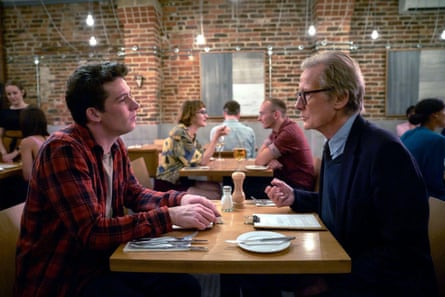
“She was fine with it. But imagine if I’d spent years grinding my teeth over the cornflakes! Tell as much of yourself to your partner as you can. If you want to dress up in women’s clothing, just say. People don’t like confrontation because we’re insecure. But you have to develop some self-knowledge, especially in areas of say, sex; to know what it is you want and need. If you don’t and then one day you say, ‘You never gave me what I wanted so I’m leaving,’ that’s not fair.”
Yet Bening, who has been married to Warren Beatty for 28 years, is Team Edward when it comes to compatibility. She subscribes to her own father’s adage: “Whoever you’re with, that’s it. If there’s a problem with the relationship, don’t have any illusions you can fix it by changing the other person.”
“I think most of us who’ve been in relationships for a long time experience that. We can’t really make somebody else do anything or feel a certain way.” (Lest you dismiss this wisdom, Bening’s parents celebrate their 70th wedding anniversary next month.)
There is something weirdly revealing about this difference of opinion, with Bening the pragmatist and the men the romantics. Hope Gap’s needy wife and repressed husband can seem to play into cliche. Yet Grace’s almost gleeful fragility is a red herring. It is male vulnerability the film really cares about, and which presumably attracted Nighy and O’Connor; both actors with a bit of history playing men unmoored by upset.
“The people I’ve looked up to, I haven’t seen as being traditionally masculine,” says O’Connor. “The performances that inspired me were things like seeing Pete Postlethwaite cry on stage. Seeing men be vulnerable is what interests me. I was always jealous in the school play that all the emotional parts were for women. I didn’t want to play the man who comes to save them.”
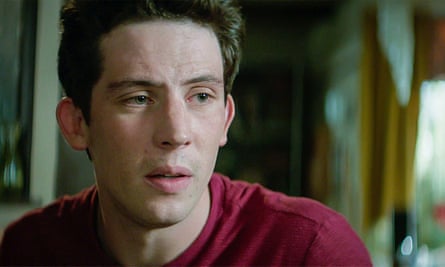
“I don’t like the look of hardly any versions of being male, frankly,” says Nighy. “I never found those expressions of masculinity attractive. When I was younger I’d keep quiet in the company of men because I always felt that I wasn’t one.”
“The myth is that men feel less, but I don’t know; I’ve never been a woman. How do you measure such things? I know that I have feelings. And I know the myth of women being weaker is male propaganda. Just more bullshit.”
Nighy warms to his theme: still not an agony uncle, but certainly a pained relative. “Men have been getting away with everything for centuries. It’s completely barmy. And until we deal with sexual politics, the world will not function properly. Yet there are always those forces – which are working overtime at the moment – trying to halt the civilising process. Medieval stuff you wouldn’t think would even hang in the air in 2020.”
This is the stumbling block when it comes to cool, impartial discussion of Hope Gap. It is a film about emotional crisis, released during a global breakdown. Even publicising it on the phone, talk soon returns to the pandemic. And the prevailing rawness means even the movie’s smaller moments assume a new potency.
Take its location: on the south coast, with the odd glimpse of Jamie cooped up in London. Nighy has been dreaming of the sea lately, he says, watching travel documentaries and compiling a formidable list of destinations to visit later. He has always wanted to live by “fast-moving water”; maybe now he will try. “It gives you a crash-course in perspective. And the sound is so refreshing. And if there’s no one else around, in my case, you can have it roll over your body. I haven’t done that for about 30 years, but it’s a very pleasurable thing I remember.”
O’Connor, raised in Gloucestershire, currently in Leeds, talks about “feeling rubbish” whenever he returns to the capital. “Tense; everything constricts. The loneliest I’ve ever been has been in London. When I’m alone on a hillside, I feel weirdly comforted.”
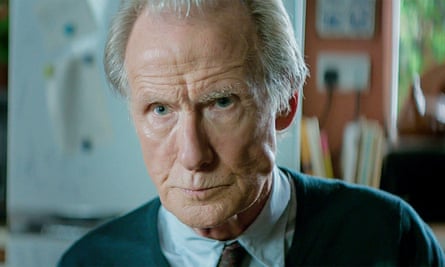
That is the other thing about the cove of the film’s title. Cliffs can be an invitation as well as a consolation. Hope Gap does not shy from exploring options if you feel the future holds little but misery. In the film’s most moving scene, Jamie tells Grace he would understand if she wanted to kill herself; but that if she does, he will know that unhappiness wins.
Apparently taken pretty much verbatim from real life, it is a winding insight into how having a child immediately recasts all your actions as an example. “I felt almost from the minute that the first of mine was born,” says Nicholson, “that my job now was to live for them and make their lives possible. Like they’re a rocket and I’m the first stage and then I drop away.”
“You can’t really feel that until you are a parent,” says Bening. “You create this incredible bond and it also creates this burden. The father of one my dearest friends committed suicide when she was in college. She’s managed heroically. But that’s still the hinge which the rest of her life turned on.” She sighs down the line. “Talk about brutal, because it’s such a repudiation of the needs of others.”
Right now, says Bening, she is just trying to ride out the “Covid-coaster”. “There are days you feel hopeful and there are days when the stories of suffering and difficulty can feel like a tidal wave. I think a lot of us feel overwhelmed with this sadness and the despair. But the minute you start to try to help, you feel better.”
She has been trying to encourage people to vote; feels buoyed by the Democratic Convention, and “that dedicated Republicans are beginning to really repudiate Trump. People of character who are now saying: this has gone too far, we’ve got to get rid of him.” What if he is re-elected? A long pause. “Oh my God. I think there will be a revolution.” You can hear her shudder 6,000 miles away.
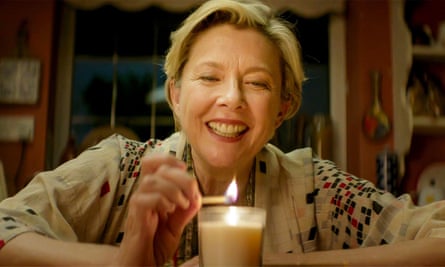
And as for Nicholson? This is a man who processed most anxiety years back. “I don’t despair,” he says. “About politics or the disease or whatever. Things have been really, really shitty for ever, actually, in different ways. If you have any sense of history, you know people have frequently been saying: ‘This is the worst time that’s ever been. It’s all going to end in tears. The world’s probably about to explode.’ It’s always been like that. Therefore it always will be like that. Therefore, it isn’t like that actually.
“There’s a sort of narcissism about thinking we’re in some especially bad time. This is the usual bad time. This is normal.”
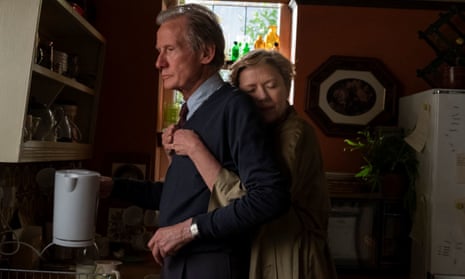
Comments (…)
Sign in or create your Guardian account to join the discussion